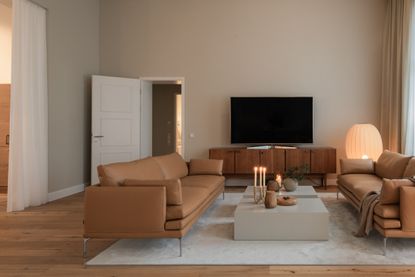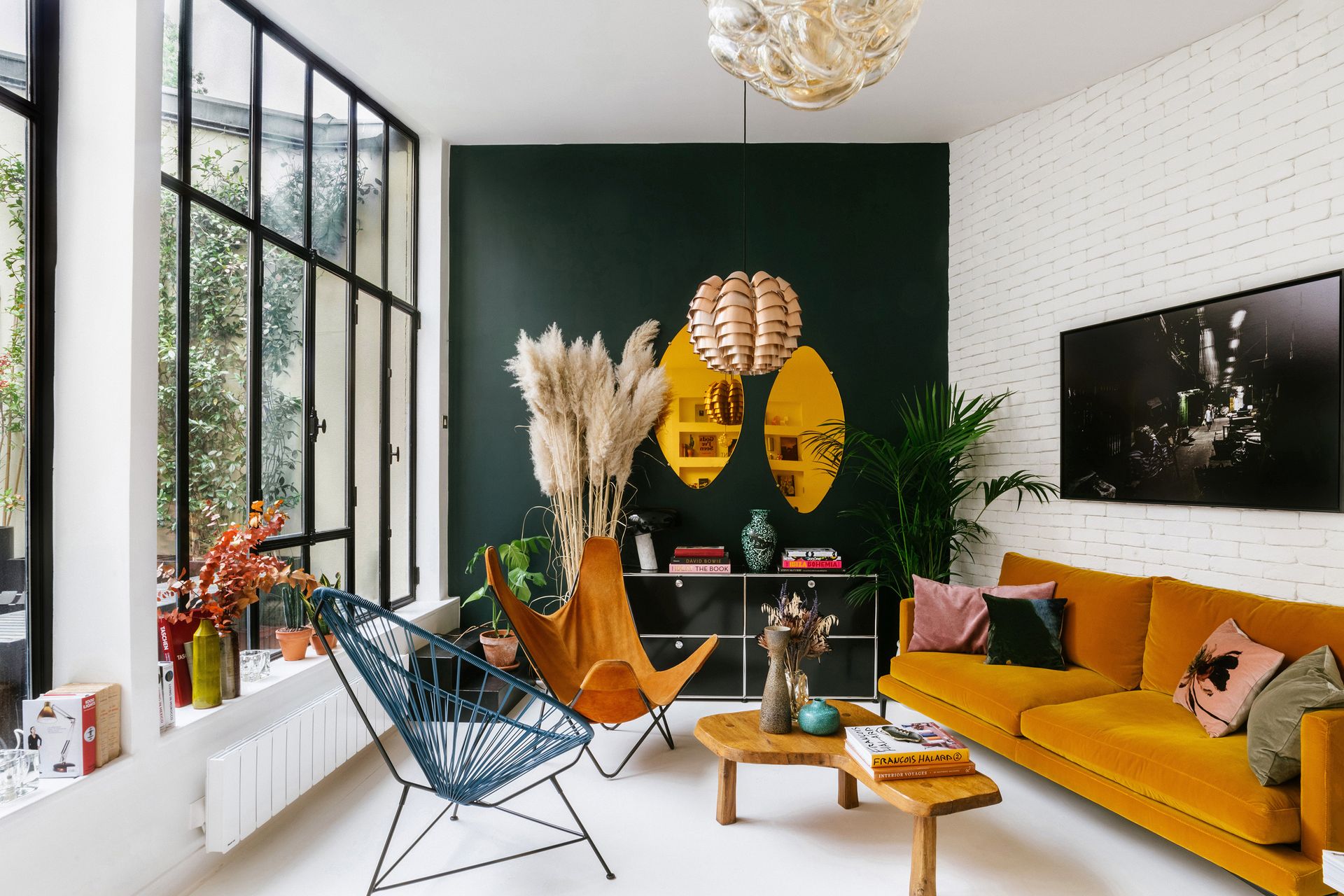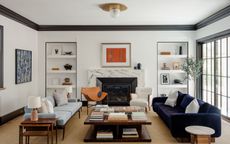5 Mistakes That Are Making Your Living Room Look Smaller — How Many Are You Making?
Are you accidentally making your living room look smaller? These are the mistakes the designers are noticing in your home

As one of the spaces in which you spend much of your life, your living room must meet many demands. It is not only a room in which to connect with family and friends, but also functions for many as their home office, media room, and everything in between.
There is also no set size for this space, it comes in forms and can all too easily become a crowded arena. By avoiding the most common mistakes, you can create the illusion of a larger space that feels more open and inviting.
We consulted the experts to discuss which pitfalls are easiest to fall into and how best to maximize the potential of your living room. They encourage you to consider each element within your interior, from the flooring to your furniture. Perhaps their most concrete piece of advice which applies to each rule is to keep things proportional. This balance of space and objects is sure to evoke a sense of harmony within your living room and enables a good flow of movement. So what are the mistakes you're likely making?
1. YOUR RUG IS TOO SMALL

Rugs are not to be underestimated in their impact. Nothing presents the comforts of home like a dense pile under your feet, but sizing is where most people go wrong.
'Small living room rugs make rooms feel smaller. As a general rule, at minimum the front feet of all of your furniture should sit on the rug - but I like rugs to go quite close to the wall on all sides, about 12" away. A great trick is to layer a smaller, more patterned rug on top of a larger, jute rug,' says Tiffany Leigh of Tiffany Leigh Design.
For her Glenn House project, the Ontario-based designer grounds her scheme with a striped chocolate rug. Not only does this play on the brown tones in the furniture, but it instantly makes the room feel warmer and cozier.
When designing your living room, prioritize your choice of rug and plan effectively to pick the size that works best for the space and your furniture.
2. YOUr ROOM DOESN’T FEEL BALANCED

To amplify the sense of space in your living room, you should take a big-picture approach. Don’t forget that each aspect of the room works in tandem with several others.
This is a sentiment that is shared by interior designer Constanze Ladner. 'I value two things in living spaces: width and harmony. To make a room feel spacious, I like to create width with curtains across the entire wall and lay out large rugs,' says Constanze.
'To create a harmonious atmosphere, I reduced the design to a single-color theme - and looked for furniture and accessories within this theme, complemented by natural materials. I also use light at different heights and in all parts of the room to enhance it,' says Constanze.
To mirror the minimalist designer’s approach in your home, choose pared-back pieces in soothing colors living room that feels more calming.
3. YOU’VE PICKED THE WRONG FLOORING

Don’t forget to look down. Lighter living room flooring doesn't just open up the room but reflects more light around the room, as proven by this captivating interior imagined by Virajo.
'Flooring choice is equally as important as the colors of the walls. It has a direct impact on the way you perceive the depth and size of space. In this living room of less than 200 square feet, going with a painted white floor immediately makes an immense impact on the spatial feel of the room while dramatically changing the look of the room,' says Sonia Lazowski, interior designer at Virajo.
Replacing your floor can be an expensive design change though so painting over the existing flooring can be a great alternative. 'If painting the existing wood floor results in a successful aesthetic bias that highlights the vintage and design furniture of the owner. There’s no secret if many art galleries prefer all-white floors — there is no competition for art, design, and accent color,' adds Sonia.
4. YOU’VE OVERCROWDED THE ROOM

It’s easy to get carried away when choosing your living room furniture. Unfortunately, what may look wonderful on your Pinterest board may not always translate in real life.
One way to avoid this is to invest in furniture that feels less obstructive and softer in the space. 'Don't use large or oversized pieces of furniture, opt for furniture with a low profile. Each object should have a purpose. Keep only what's necessary to avoid saturating the space,' says Marie Ingrid, founder of studio MIID.
Meaning is key when choosing your furniture so the few pieces you surround yourself with are functional and appeal to you every day. The same approach applies to smaller items too.
'While personal touches and decorative items add character to your living room, too many can make it feel cramped and smaller,' says Kati Curtis of Kati Curtis Design. 'Adopt a minimalist living room approach and only display items that hold significant value or purpose.'
5. THERE IS NO BREATHING ROOM FOR YOUR FURNITURE

It’s not just humans that need space, living room furniture does too. Even the most beautiful furniture can be restrictive and unappealing if it's not given enough room.
You will also inevitably become frustrated as you try to shuffle through tight spaces where corners meet, or furniture is too close.
'Furniture pieces placed too closely together can make a small living room appear stuffed. Ensure enough space between items for easy movement and an airy feel. Some good rules of thumb are 18” between the sofa and the cocktail table and 30” between the back of your dining room table and a wall,' advises Kati.
Creating a floor plan to allocate space for your furniture is a great way to assess if your pieces are the right size for the room.
Minimalist buys for a spacious and stylish living room

Dimensions: 6'2" x 9'2"
Price: £1,555

Dimensions: 15.7"dia x 35"h
Price: $79

Price: $111.73 per box
Be The First To Know
The Livingetc newsletter is your shortcut to the now and the next in home design. Subscribe today to receive a stunning free 200-page book of the best homes from around the world.
Writer and design expert Faaizah Shah is the founder of The Interiors Consultancy. She has worked with designers such as Staffan Tollgard and design houses such as Sanderson to help them understand and communicate their narratives. She is known for crafting engaging stories and imaginative content, and understanding great decor from her years alongside some of the best creatives in the industry. She is also a contributor to Livingetc.
-
 'Subtle Gray' Is The New Color Trend Designers Are Using to Replace White — It's So Much Warmer and More Luxe
'Subtle Gray' Is The New Color Trend Designers Are Using to Replace White — It's So Much Warmer and More LuxeIt’s the new shade grabbing designers’ attention and you should know about it. But what is ‘subtle gray’, and how can you use it?
By Raluca Racasan Published
-
 Exactly When to Fertilize a Lawn After Winter — Experts Guarantee You a Beautiful Backyard All Year
Exactly When to Fertilize a Lawn After Winter — Experts Guarantee You a Beautiful Backyard All Yearif you know when to fertilize a lawn after winter then you can set yourself up for a well manicured and healthy backyard all year long
By Jacky Parker Published

